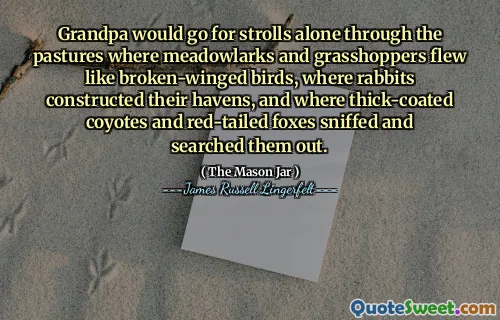
She shook her head, and we parted, kissing, as the first beams from the sun burst forth behind us. When I returned to my bedroom, the scent of her hair remained on my pillow. For the first time in my life, at the age of twenty-five, I was in love.
[Markdown format]
This excerpt beautifully captures the ephemeral yet profound experience of discovering love at a later stage in life. The imagery of dawn breaking, with "the first beams from the sun," symbolizes a new beginning, hope, and illumination—both literal and metaphorical. The act of parting with a gentle head shake signifies a bittersweet farewell, emphasizing the fleeting nature of the moment, yet it is tinged with the promise of new emotional territory. The lingering scent of her hair on the pillow serves as an intimate reminder of the connection, evoking sensory memories that anchor the narrator's feelings. It highlights how love, even when brief, can leave an indelible mark on our senses and psyche.
What resonates deeply here is the sense of self-awareness gained through love. The narrator's acknowledgment that this is his first experience of love at twenty-five suggests personal growth and perhaps a long search for genuine connection. The narrative underlines the significance of these newfound feelings, which come with both joy and a hint of longing. The story tells us that love is not confined to youth; instead, it can arrive unexpectedly or after years of waiting, bringing clarity and depth to life. This moment becomes a testament to the universal truth that love’s impact transcends age; it is an awakening that deepens our understanding of ourselves and others.
Moreover, there's an acknowledgment of love’s transient beauty—the parting kiss, the scent on the pillow—but also its lasting effect. Moments like these remind us that love's worth isn't solely in its permanence but also in its capacity to transform us for the better. The writer captures a universal narrative of human connection: fleeting moments that ultimately shape enduring memories and personal growth.
---James Russell Lingerfelt---







